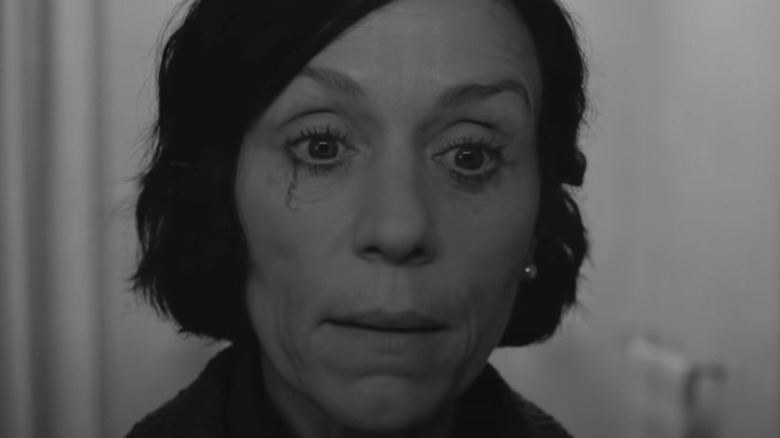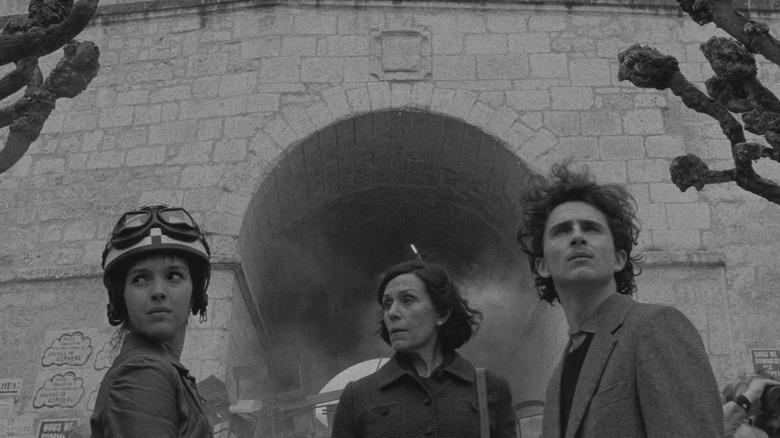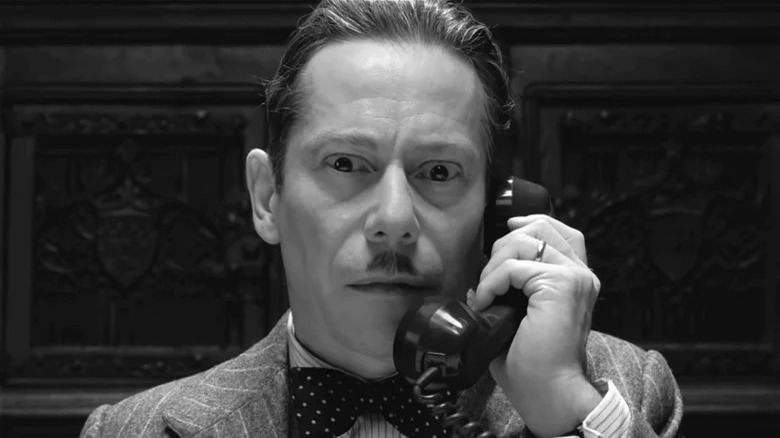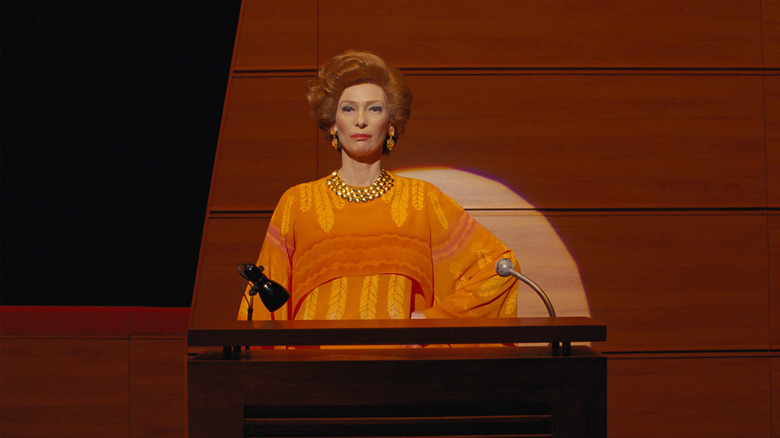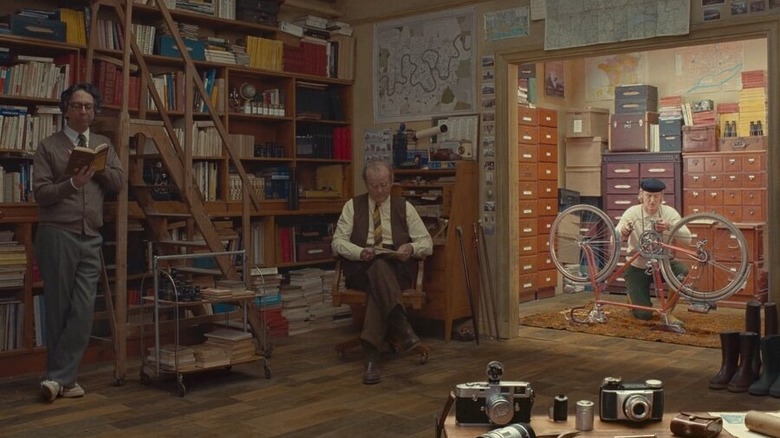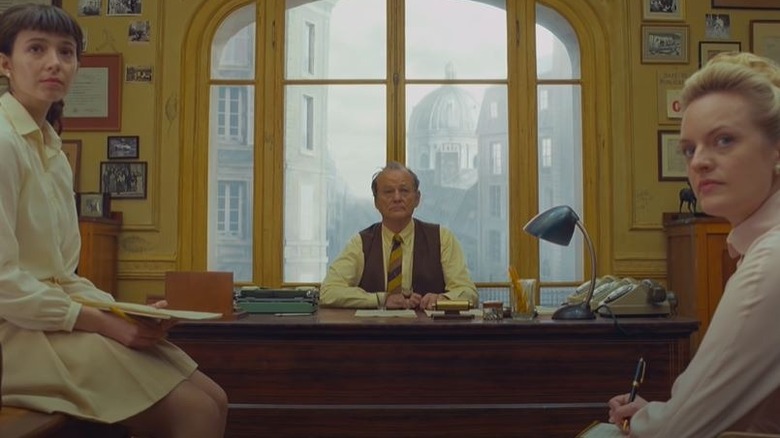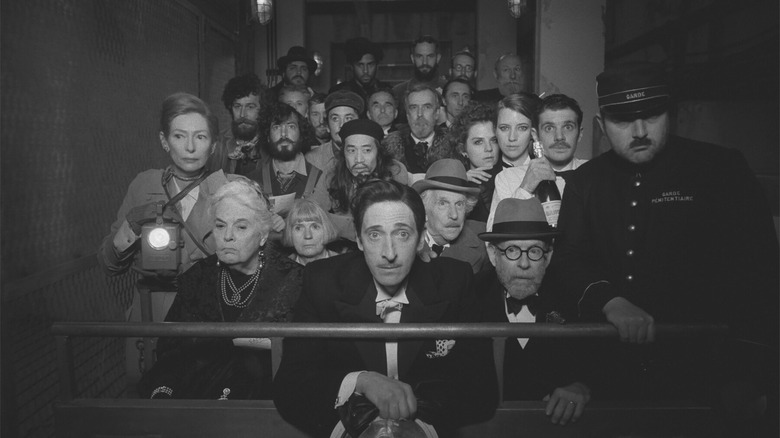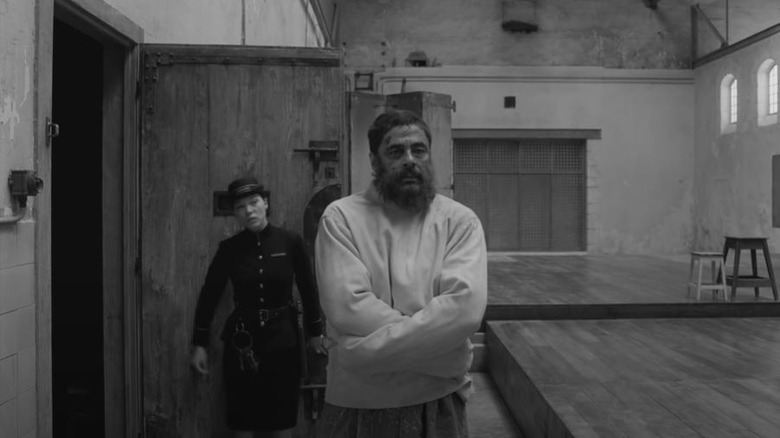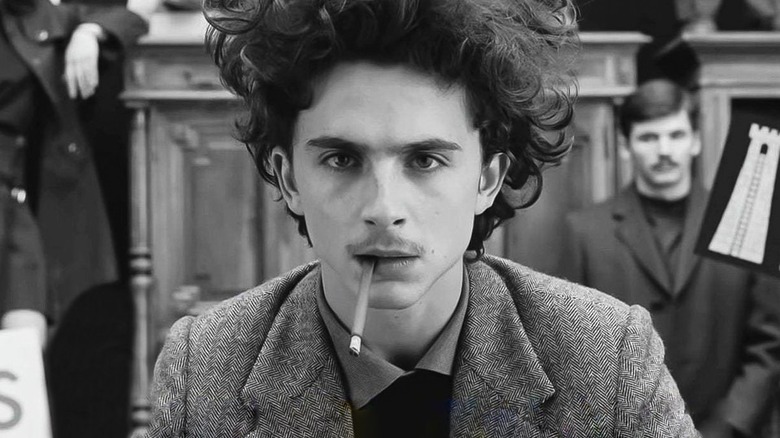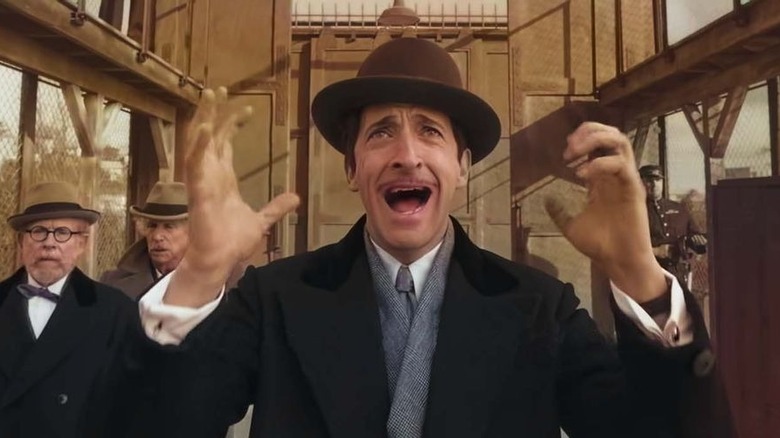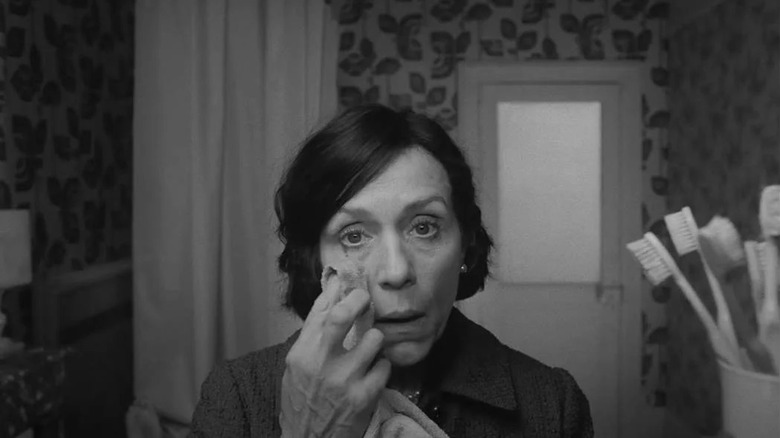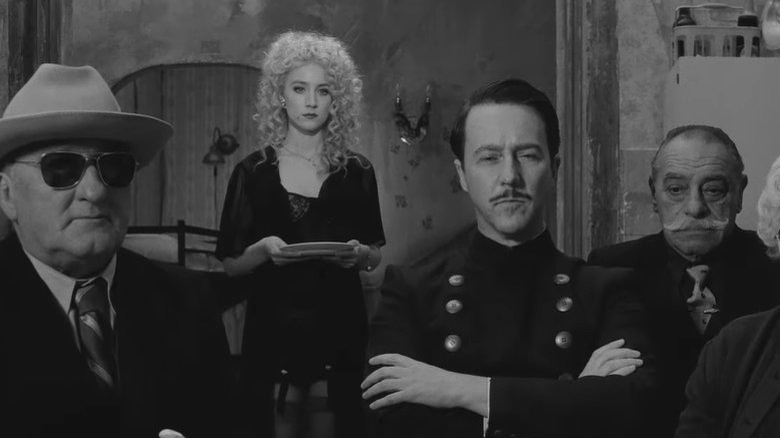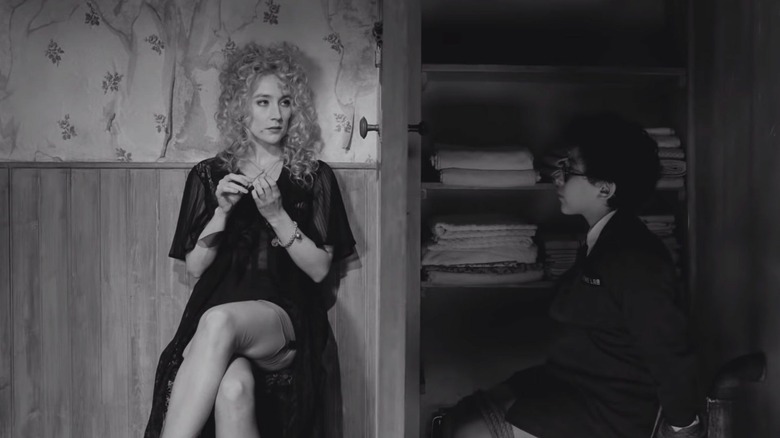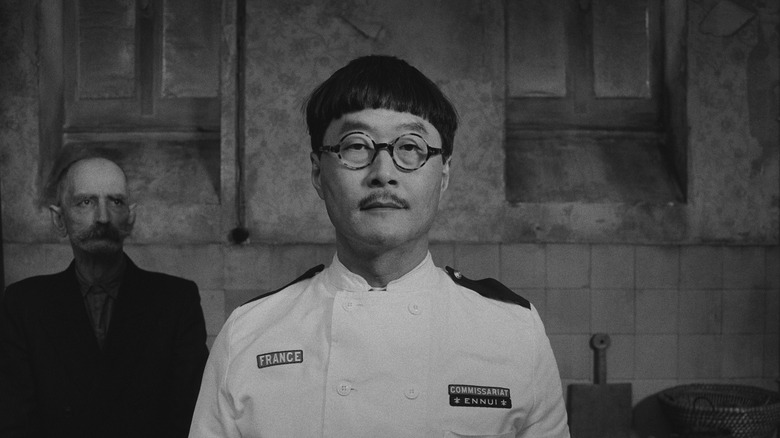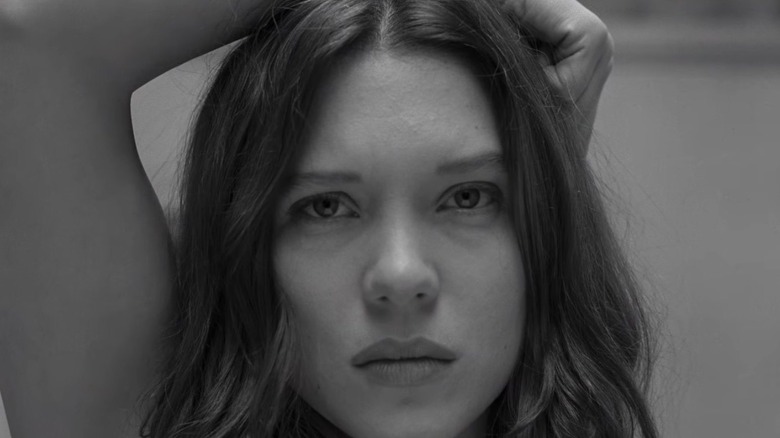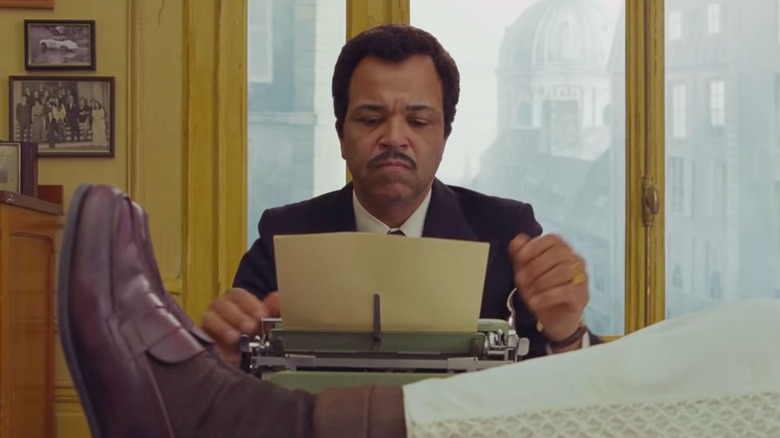The Best Characters In The French Dispatch Ranked
A year and a half after its initial scheduled date of the release, "The French Dispatch" finally hit theaters in late October 2021. The latest film from quirky director Wes Anderson, "The French Dispatch" is an anthology, telling stories in the form of potential magazine articles sent from Ennui, France to a town in Kansas. Its main function is to give American readers of taste in life in small-town France, but the articles sometimes take on a life of their own.
There's two things that Wes Anderson is known for as a director. The first is his incredible commitment to maintaining a unique visual palette, never framing any shot in a conventional matter. The second is how frequently he's able to wrangle together an impressive group of talented, high-profile actors to perform in his films, many returning over and over again. Part of this is that they like working with him, but they're also undoubtedly enamored with the remarkable characters they're asked to play.
15. Juliette (Lyna Khoudri)
There's nothing like a college student who's learning about politics for the first time and is convinced that they alone have all the answers. That is, unfortunately, Juliette's role in "The French Dispatch" — to make everyone else feel as though their commitment to the cause isn't genuine enough, and that whatever they're doing is an insult to the movement. Granted, Zeffirelli isn't exactly Che Guevara, and sure, his manifesto is ghostwritten by the much older woman he's sleeping with, but how many student activists are actually able to mount a revolution, anyway?
She's a bit tiresome, to be honest. There's also plenty of truth in the exchange between her and journalist Lucinda Krementz, when she is told that part of being an adult is learning how to graciously accept an apology rather than being a childish brat about it. But Lyna Khoudri nonetheless has a spark to her performance that makes you root for these two crazy kids.
14. Commissaire (Mathieu Amalric)
Our Commissaire is in all honesty one of the least developed characters in the final story of "The French Dispatch," "The Private Dining Room of the Police Commissioner." He invites writer Roebuck Wright over to a dinner party for a meal prepared by the legendary chef Nescaffier, only to have it unceremoniously interrupted by the kidnapping of his young son, Gigi. And really, his relationship with Gigi is the only thing that stands out about him.
Raising the boy as a single father, he took every effort to train him in the art of policemanship, and the little boy likely has more investigations under his belt than most fully trained coppers. His devotion to his son is incredibly endearing, and the efforts he will go to retrieve Gigi drive the action of this entire storyline. Their tearful reconciliation, captured in the form of an animated sequence, is surprisingly moving.
13. JKL Berensen (Tilda Swinton)
You can always trust Tilda Swinton to make the most of any role she's been given, no matter how thankless. And this is certainly true of her performance as JKL Berensen, the writer of the piece entitled, "The Concrete Masterpiece." She spends the majority of the sequence at a podium, telling an unseen audience about the merits of one of the 20th century's most peculiar artistic geniuses, Moses Rosenthaler. Her delivery is perfect, and she finds plenty of moments to inject personality into the proceedings — but at the end of the day, most of her role is limited to a particularly well-read speech.
The only time she plays a role in the story is as the aide of an eccentric Kansas millionaire, who shows interest in purchasing Rosenthaler's masterwork. It's here that we wish we had the opportunity to learn more about Berensen, the strange and exciting life she must have led during this era. Alas, a vignette is all we have, and there's no time to delve any deeper into her background.
12. Herbsaint Sazerac (Owen Wilson)
The introduction of Ennui, France, plays out a little bit like the beginning of Thorton Wilder's "Our Town." Herbsaint Sazerac (who, by the way, has one of the greatest names known to man) goes through a brief and incredibly eccentric background of the town, showcasing its various districts and even detailing the average annual snowfall — right down to the number of flakes. But the facts that he chooses to include tell us a little something both about the nature of the town as well as Sazerac himself.
How can you dislike a character who highlights in his town biography those who are most often forgotten: the sex workers, the criminals, the poverty-stricken elderly, the bodies that wash up on the shore of the river at a seemingly consistent rate since time immemorial? The fact that he gives these figures the spotlight in his article rather than the rich and noteworthy — that he thinks it gives the article a little bit of local color — is endlessly endearing.
11. Arthur Howitzer, Jr. (Bill Murray)
Pour one out for the consummate journalist, reflecting the world-weariness and exasperation of editors everywhere. Bill Murray doesn't have a ton to do in this role, as he doesn't participate in any stories, but Arthur Howitzer, Jr is the glue that binds the various tales together. Even so, he makes the most of his moments. The "A League of Their Own" inspired "no crying" rule that is strictly observed in his office. There's his half-hearted frustration whenever his writers go wildly off the brief that they were assigned. Then there's his pained expression while listening to a journalist justifying their efforts to have a hotel stay expensed to the newspaper, even though she could have just as easily written it in the office.
But at the end of the day, he always relents. He understands the circuitous way that stories are sometimes birthed — that even when the writers begin with the best of intentions, their articles can sometimes have a mind of their own and go off in unexpected directions.
10. Upshur "Maw" Clampette (Lois Smith)
Upshur "Maw" Clampette (played by Lois Smith) is not the biggest player in "The French Dispatch" — she really only has a line or two in her entire vignette. But what a life this woman has led! She deserves her own film. A millionaire out of Kansas, Maw is determined to develop one of the premier art collections in the American Midwest. And she's not just interested in conventional art, either: when the opportunity arises for her to travel across the ocean to see an exhibit of paintings by an inmate being held in an actual prison, she doesn't waste a second before saying yes.
And when she finally sees the art, only to learn that they've been painted directly onto the concrete of the hobby room at the jail, she is undeterred in her interest. Most people would consider a fool's errand the logistics of getting the concrete slabs out of the wall so that they could be displayed properly in a more prestigious venue. Maw simply writes a check. Honestly, who doesn't want to be Maw when they grow up?
9. Moses Rosenthaler (Benicio Del Toro)
Moses Rosenthaler is one of the most developed characters in "The French Dispatcher." We get his entire backstory, courtesy of a speech given by JKL Berensen, and his prison life is well trod territory. He's a strange individual, undeniably talented but plagued by creative indecision — an unstable, violent man who is nonetheless capable of great beauty.
Rosenthaler is brought to life by Benicio Del Toro — and briefly by Tony Revolori of "The Grand Budapest Hotel" fame, who plays the younger version of the character and passing the role over after Rosenthaler has spent ten years in jail. He is a mass of contradictions. The character is inscrutable and, like his art, the more you try to understand him, the less you do. He has a lovely chemistry with Simone, his guard and muse, and Del Toro's bizarrely engaging performance is the crucial centerpiece of "The Concrete Masterpiece."
8. Timothee Chalamet (Zeffirelli)
The most important thing you need to know about Zeffirelli (Timothee Chalamet) is that you shouldn't look at him for too long — he feels shy about his new muscles. An empathetic but ideologically confused student activist, the idea of a revolution is more important to him than the ideas that are actually espoused in it. He's an unlikely leader, quiet and unsure of himself, easily led by the female figures in his life.
The relationship between him and the much older Lucinda Krementz is peculiar but somehow charming, because they seem to understand each other in a way that few others do. His face becomes an icon for young revolutionaries everywhere, which is appropriate: he functions much better as the perfect image of a rebel than an actual political agitator. But to be honest, his character would likely end up feeling a little bit empty if it weren't for the unexpectedly poignant turn that his vignette takes — rendering meaning to a life that was otherwise largely unexceptional.
7. Julian Cadazio (Adrien Brody)
"The French Dispatch" is not one of Wes Anderson's most laugh-out-loud funny films. But where there is comedy, Adrien Brody as Julian Cadazio is often responsible. Cadazio is part of a family business, a young art dealer who works with his two uncles (Bob Balaban and Henry Winkler) to not only sell art, but create the kind of buzz around artists that allows their work to be sold at astronomical and heavily-inflated prices. But at the beginning of his vignette in "The French Dispatch," there's a bit of a roadblock for Cadazio: he's serving time in prison for tax fraud.
Does that stop him? Of course not. After seeing Moses Rosenthaler's work in a prison art show, he demands to buy the painting and he commits to working with him as an exhibitor. Cadazio is one of the funniest characters in "The French Dispatch," and so much of this comes from the dynamic between him and Rosenthaler — as the latter perpetually thwarts his efforts to make them both rich.
6. Lucinda Krementz (Frances McDormand)
What, like Frances McDormand is going to put in a bad performance? Not on your life. Her portrayal of the journalist Lucinda Krementz occupies such a small part of the film, and yet she feels lived-in in a way that none of the other characters quite seem to. She's sent to the university in Ennui to cover the story of a student protest, which would go on for several days and end up involving a barricade and tear gas as the idealistic youngsters do their best "Les Misérables" impression.
Krementz is content with her career as a writer, but that doesn't mean she never faces the occasional bout of loneliness, and she struggles throughout her time at the school with maintaining journalistic neutrality. She can't quite avoid getting involved, especially when it comes to her relationship with Zeffirelli, which quickly takes on a physical component. She feels too much, a quality that might prevent her from staying strictly objective from time to time, but is also the reason she's such a good writer.
5. Showgirl #1 (Saoirse Ronan)
Her character doesn't get a real, actual name? Fine — she doesn't need one. It's Saoirse Ronan, and she's going to steal your movie even if she's only referred to as "Showgirl #1" or, alternatively, "Junkie." During the kidnapping sequence, her room is next to where Gigi is being held. She immediately catches on to the fact that he's trying to tap out Morse code on a radiator pipe, and begins a conversation with the pint-sized Sherlock Holmes in the making.
Ronan only has about three minutes of screen time in this film, but she makes an incredible impression with almost nothing at her disposal. The two characters are able to have a brief moment of connection, where she sings a beautiful and melancholy French song after he requests a lullaby, and he joins in. Wes Anderson focuses so much on style, but there are nevertheless moments of real emotional impact laced within "The French Dispatch," and this is a key example.
4. Gigi (Winsen Ait Hellal)
Wes Anderson has absolutely no problem coming up with eccentric but lovable child characters, and young Gigi is no exception. The only son of the Commissaire of the Ennui police force, he has been trained his entire life to take over the post, and as such he is competent beyond his years. It's a skill set that would be immeasurably helpful if Gigi were to, say, be kidnapped by criminal forces furious at the imprisonment of the Abacus (Willem Dafoe), their collective finance whiz.
Throughout his kidnapping scare, he displays a reserve of inner strength that would make his father proud, and an endlessly inventive mind that allows him to orchestrate his own rescue from inside a locked closet. But at the end of the day, he's still just a little kid, which is what makes his conversation with Showgirl #1 so sweet — he may be a tough cookie, but even he needs some comfort after a long day of being chloroformed and held against his will.
3. Nescaffier (Steve Park)
Nescaffier is not a man of many words. He spends most of his vignette in the background, content to serve up unbelievably delicious food to the Commissaire and his guests. He is one of the premier chefs in the world, who has settled by chance in Ennui, France. But as the story unfolds, we are given an opportunity to see the hidden depths of Nescaffier.
He is brave, as shown by his willingness to step into the belly of the beast in an effort to rescue Gigi. He is compassionate: he alone realizes that while the kidnapping case has carried on, no one had bothered to bring food to their most guarded prisoner, and he remedies the situation. And he is contemplative. Nescaffier, after having tasted poison for the first time in his life, remarks upon how long it has been since he experienced the joy of an unexpected flavor, even if it isn't an entirely pleasant one. More than any other character, he seems to reflect Anderson's filmmaking approach: perpetually trying to find new visual ways of telling stories.
2. Simone (Léa Seydoux)
Simone. What can we say about Simone? She's an enigma. She's introduced while posing naked as Moses Rosenthaler's muse, but subverts our expectations moments later by appearing in the uniform of a prison guard — and as such is endlessly fascinating. We get snippets of her difficult childhood, her intimate relationship with Rosenthaler, the child she was forced to abandon. And honestly, we could have spent the entire film learning about Simone and it wouldn't be enough.
There are moments when she seems as though she's not entirely real: she has an ethereal quality that belies the tidy, no-nonsense veneer of her prison guard persona, almost gliding in and out of rooms like a dream. Anderson films her in a variety of postures, noting her ability to pose for Rosenthaler in any strange contortion necessary for his painting without any apparent pain, adding to her mystique. "The Concrete Masterpiece" is one of the better sequences in "The French Dispatch," and that's largely a result of the captivating presence of Léa Seydoux as Simone.
1. Roebuck Wright (Jeffrey Wright)
It's scientifically impossible for Jeffrey Wright to enter a film and not, somehow, make it better. So it's no surprise that his performance as Roebuck Wright, the author with a "typographic" memory (the ability to remember everything he's ever written), would steal the show. It certainly doesn't hurt matters that he is given the most engaging vignette of "The French Dispatch." He sits on a sound stage next to a 1950s-era talk show host (Liev Schrieber), reciting from memory an encounter he had involving the Commissaire of the prison in the town of Ennui, France, his missing son, and perhaps the best cook ever to live.
With his languid speech and wry sense of humor, he's often little more than an observer of this unfolding crisis rather than an active participant, and breathes life into him. His perspective on the final conversation he had with Nescaffier represents one of the few moments in the film where Anderson reaches for deeper meaning rather than focusing primarily on aesthetics.
